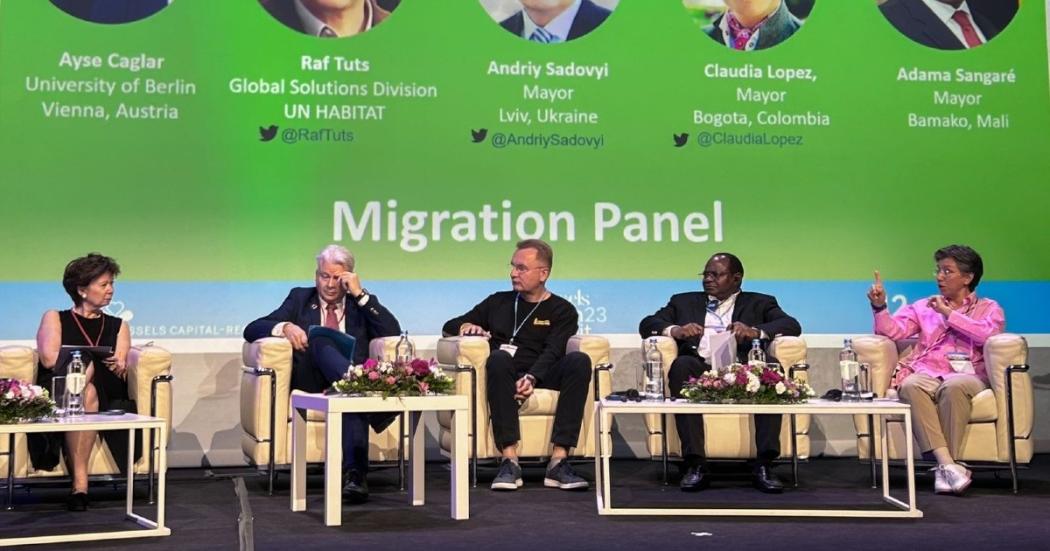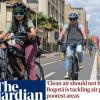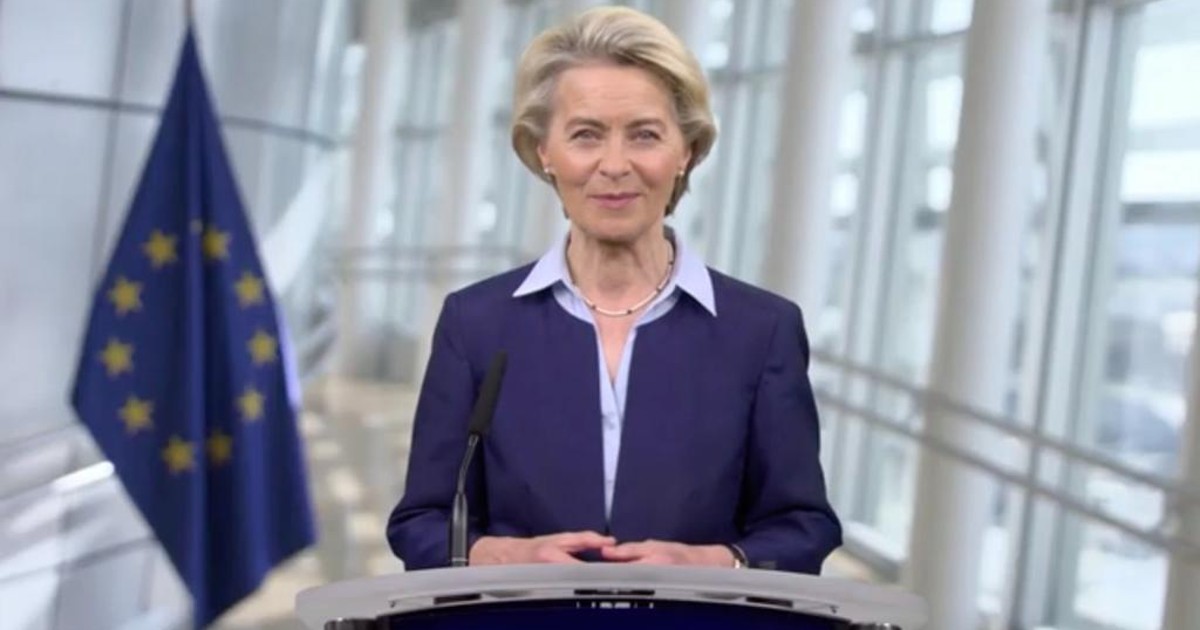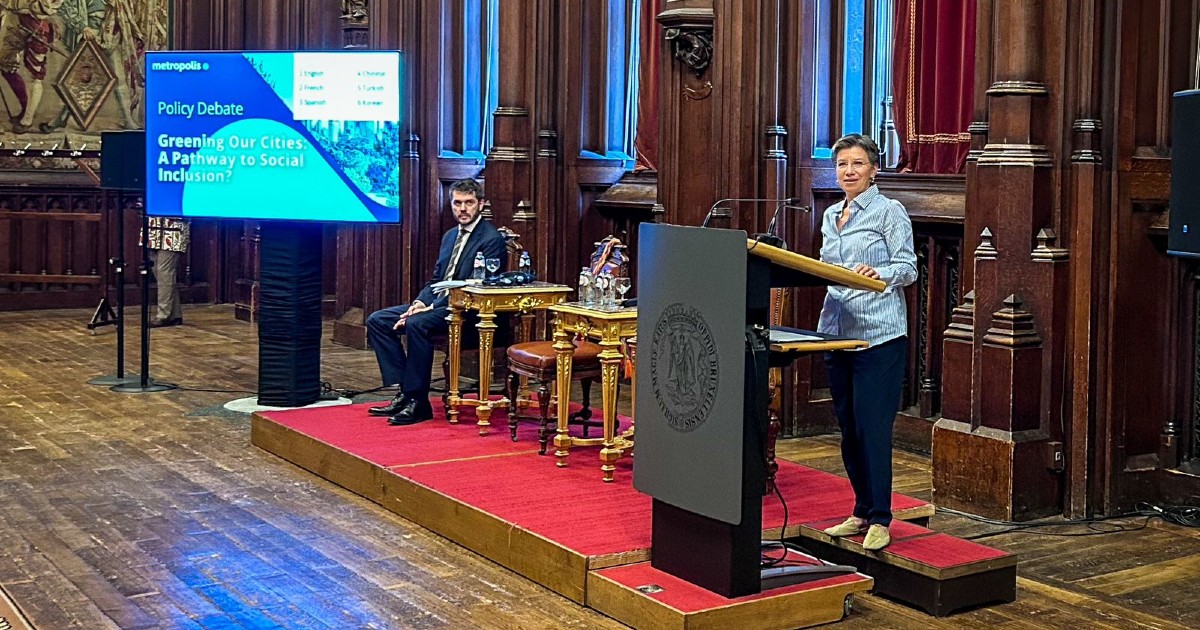As part of the Brussels Urban Summit, Claudia López, Mayor of Bogotá and current President of the global city network Metropolis, participated in the panel "Migration and Diversity: Cities lead the way in turning challenges into opportunities," an event organized by Brussels Capital Region.
The mayor was joined at the event by Andriy Sadovyi, Mayor of Lviv (Ukraine); Adama Sangaré, Mayor of Bamako (Mali); Raf Tuts, Director of UN-Habitat's Programs Division; and Ayşe Çaglar, Professor of Social and Cultural Anthropology at the University of Vienna. The panelists discussed how the phenomenon of migration and growing diversity shape cities, and what kind of strategies governments and civil society can develop to address the influx and outflow of new populations.
In her speech, Mayor Claudia López stated that in Bogotá, the process of caring for the migrant population has transitioned from a humanitarian matter to a process of social, economic, and cultural integration. She mentioned that despite the social and economic crisis caused by the COVID-19 pandemic, Bogotá provided assistance to over 602,000 "new Bogotans." "But never, ever forget that when Colombia was in the middle of a civil war, Venezuela received 4,500,000 Colombians. So it is our moral mandate to help now that they need us," commented the Mayor.
In this tweet, Mayor Claudia López shared a segment of the panel "Migration and Diversity: Cities lead the way in turning challenges into opportunities."
En foro sobre la inclusión de la población migrante, de la Cumbre Urbana de Bruselas #BUS2023, compartimos la experiencia de Bogotá como receptora de cientos de miles de venezolanos y de colombianos desplazadas internamente por la violencia. Priorizamos la atención de la primera… pic.twitter.com/pDt7SOqLLd
— Claudia López Hernández (@ClaudiaLopez) June 14, 2023
She also referred to the role of the National Government in implementing the Temporary Statute of Protection for Venezuelan Migrants, which granted a legal status of inclusion for Venezuelan migrants.
In the same vein, Mayor López stated that Bogotá eliminated administrative barriers to the care of the migrant population, facilitating their access to social services in the Capital District without any issues. "For example, 57,000 from migrated families, get into Bogota’s schools, public school system in a year. It was tough to do, but we were able to do it," she indicated.
López also expressed that, in collaboration with the National Government, the 'new Bogotans' were included in a basic income program to address the difficult situation of extreme poverty within the context of the pandemic. Furthermore, she shared with the experts that employment is a fundamental factor for social inclusion to improve the quality of life of the migrant population. For this reason, she mentioned that Bogotá created inclusion programs that allowed closing the gaps in accessing employment and thus balancing the formal job market.
"In the case of Bogotá 60% of the employees come from small and medium companies, we said, if you engage either a woman, or a youth, or any member of the internal refugees, or the “New Bogotanos”, we will pay you for a year,' we will pay you one-third of the monthly salary you will pay for a year'," explained the Mayor of Bogotá.
She also affirmed that the city's recovery process following the impact of the pandemic has been very favorable, and Bogotá currently has the lowest social poverty rate of the past 15 years.
"These pragmatic kinds of things, that at the same time serve the local economy, serve the locals, but at the same time serve the “New Bogotanos”, are the kind of things that I think, in our experience, work," concluded the Mayor in the panel.
The vision of caring for people, democracies, and the planet, as defined by Bogotá, has been highlighted in various international spaces and is already a reference for several cities worldwide facing similar scenarios, particularly those related to social inclusion, closing gender gaps, and responding to the climate crisis.
Other activities in Brussels
During the third day of the summit, Mayor Claudia López also held a meeting with Greg Clark, a global expert in cities, urban investment, and sustainable urban transition. In this meeting, they discussed the processes of planning and sustainable urban transition that are being implemented in the city, as defined in the Master Plan and the Climate Action Plan, aiming for decarbonization and adaptation to climate change.
Earlier, she participated in a roundtable convened by Eurocities, the network of major European cities, where she joined over 100 mayors and leaders from around the world to discuss city diplomacy and exchange best practices in this field. It was emphasized that cities are already on their way to achieving better cooperation in the face of global crises, and how this cooperation can evolve in terms of participation in multilateral forums such as those of the United Nations.
In her role as President of Metropolis, the network of major cities and metropolitan areas, the Mayor led the General Assembly of this organization. They reviewed plans, welcomed new members, and discussed the actions to be developed during the remaining six months of Bogotá's presidency.








